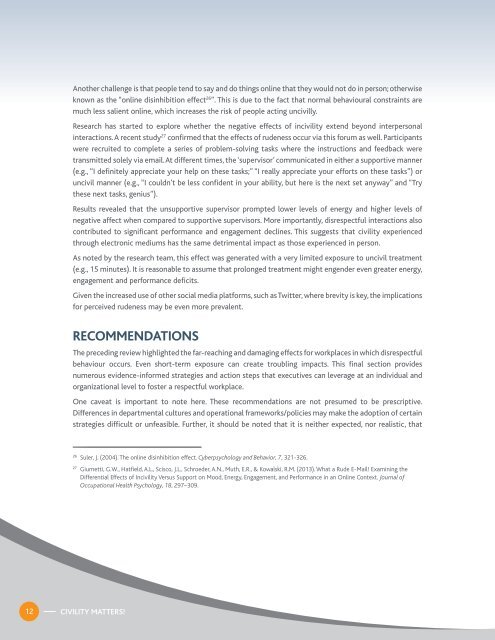CIVILITY MATTERS!
civility report - eng
civility report - eng
Create successful ePaper yourself
Turn your PDF publications into a flip-book with our unique Google optimized e-Paper software.
Another challenge is that people tend to say and do things online that they would not do in person; otherwise<br />
known as the “online disinhibition effect 26 ”. This is due to the fact that normal behavioural constraints are<br />
much less salient online, which increases the risk of people acting uncivilly.<br />
Research has started to explore whether the negative effects of incivility extend beyond interpersonal<br />
interactions. A recent study 27 confirmed that the effects of rudeness occur via this forum as well. Participants<br />
were recruited to complete a series of problem-solving tasks where the instructions and feedback were<br />
transmitted solely via email. At different times, the ‘supervisor’ communicated in either a supportive manner<br />
(e.g., “I definitely appreciate your help on these tasks;” “I really appreciate your efforts on these tasks”) or<br />
uncivil manner (e.g., “I couldn’t be less confident in your ability, but here is the next set anyway” and “Try<br />
these next tasks, genius”).<br />
Results revealed that the unsupportive supervisor prompted lower levels of energy and higher levels of<br />
negative affect when compared to supportive supervisors. More importantly, disrespectful interactions also<br />
contributed to significant performance and engagement declines. This suggests that civility experienced<br />
through electronic mediums has the same detrimental impact as those experienced in person.<br />
As noted by the research team, this effect was generated with a very limited exposure to uncivil treatment<br />
(e.g., 15 minutes). It is reasonable to assume that prolonged treatment might engender even greater energy,<br />
engagement and performance deficits.<br />
Given the increased use of other social media platforms, such as Twitter, where brevity is key, the implications<br />
for perceived rudeness may be even more prevalent.<br />
RECOMMENDATIONS<br />
The preceding review highlighted the far-reaching and damaging effects for workplaces in which disrespectful<br />
behaviour occurs. Even short-term exposure can create troubling impacts. This final section provides<br />
numerous evidence-informed strategies and action steps that executives can leverage at an individual and<br />
organizational level to foster a respectful workplace.<br />
One caveat is important to note here. These recommendations are not presumed to be prescriptive.<br />
Differences in departmental cultures and operational frameworks/policies may make the adoption of certain<br />
strategies difficult or unfeasible. Further, it should be noted that it is neither expected, nor realistic, that<br />
26<br />
Suler, J. (2004). The online disinhibition effect. Cyberpsychology and Behavior, 7, 321-326.<br />
27<br />
Giumetti, G.W., Hatfield, A.L., Scisco, J.L., Schroeder, A.N., Muth, E.R., & Kowalski, R.M. (2013). What a Rude E-Mail! Examining the<br />
Differential Effects of Incivility Versus Support on Mood, Energy, Engagement, and Performance in an Online Context. Journal of<br />
Occupational Health Psychology, 18, 297–309.<br />
12<br />
<strong>CIVILITY</strong> <strong>MATTERS</strong>!


